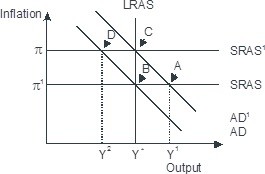Imagine that you are an economist and a believer in rational expectations theory. The chairwoman of your country’s central bank is considering announcing a series of three increases in the money supply over the next year. Her hope is that this will drive real GDP higher. What would you advise the chairwoman?
a. Proceed with the announcement.
b. Proceed with the announcement but increase the money supply by smaller amounts once a month.
c. Do not increase the money supply as it will boost inflation without improving real GDP.
d. Do not increase the money supply as it will reduce real GDP instead of improving it.
c. Do not increase the money supply as it will boost inflation without improving real GDP.
You might also like to view...
Based on the figure below. Starting from long-run equilibrium at point C, a decrease in government spending that decreases aggregate demand from AD1 to AD will lead to a short-run equilibrium at__ creating _____gap.
A. B; no output B. D; an expansionary C. B; recessionary D. D; a recessionary
According to this Application, from the early 1990s until quite recently, the U.S. economy grew. This growth in the U.S economy
A) decreased foreign investment in the U.S. B) decreased imports to the United States. C) caused the level of U.S. exports to decline. D) increased the U.S. demand for foreign products.
The marginal physical product of labor is the
A) total output divided by the number of labor employed. B) wage that must be paid to labor. C) value of sales divided by additional labor used. D) change in output generated by a unit change in labor.
The study of how firms interact in a market is a
a. waste of time b. normative subject c. microeconomic topic d. topic in political science e. macroeconomic topic